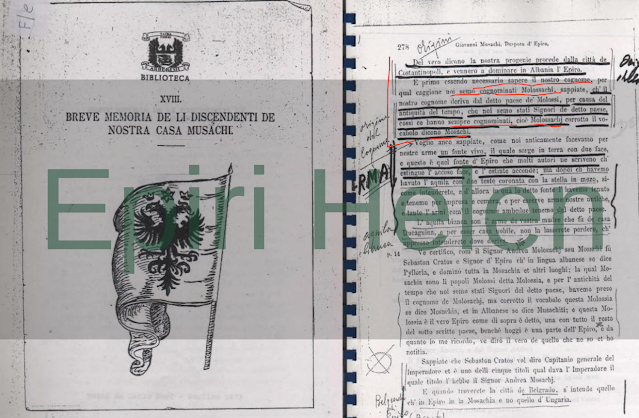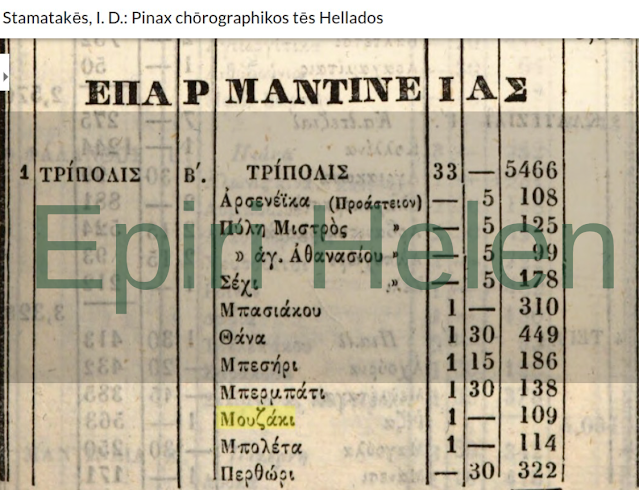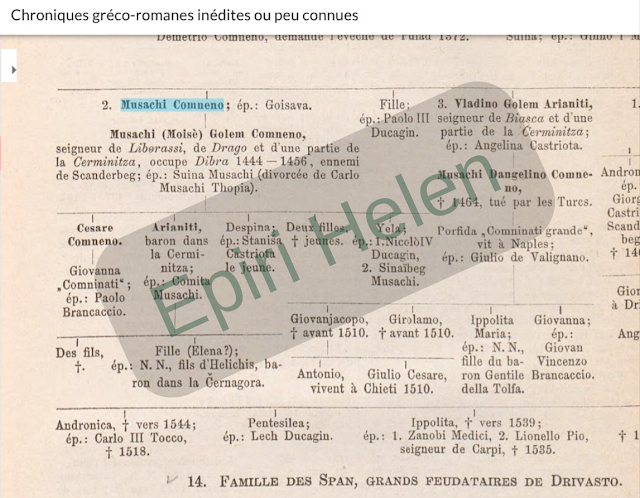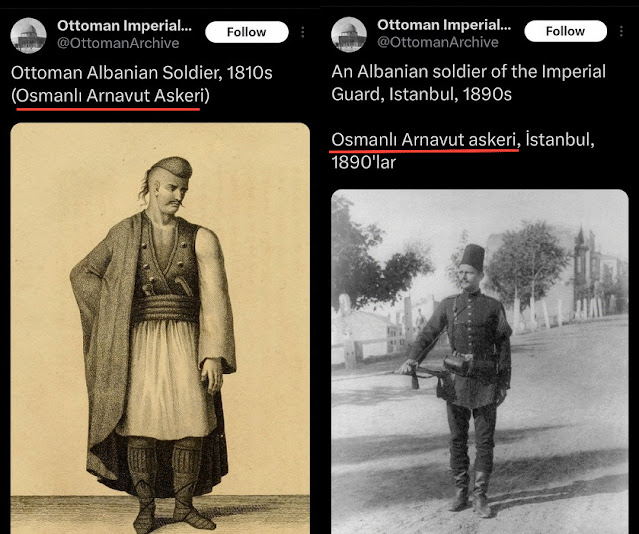Musachia, the epirote rulers, bore the last name Molossian.- Sundimtarët Epirote Muzaket Kishin Mbiemrin Mollose
According to Giovanni Musachi, a descendent of the Musacchia family, the last name, Molossachi, which translates to "Molossian," was corrupted over time to become Mosachi. Mosachia, he says, is another name for Molossia and was the home of the Molossians.
Sipas Giovanni Musachi-t, një pasardhës i familjes Musacchia (Muzaka) mbiemri I tyre ishte dikur Molossachi, që përkthehet si "Mollose", dhe u shtrembërua me kalimin e kohës dhe u be Mosachi (Muzaka)
Mosachia, thotë ai, është një emër tjetër për Molloset dhe ishte familja ose vendi Molloseve.
The same thing is confirmed by the author Hopf that Mosachi were once called Molossachi.
E njejta gje konfirmohet dhe nga historiani Gjerman Hopf qe mbiemri Muzaka dikur ishte Molossachi qe do te thote Mollose.
In his book Giovanni Mosachi admits that they are Molossians. He says
Don Giovanni my father had a marble tabernacle built in the main church of Francavilla in the land of Otranto, where the sacrament is located, and he had an epitaph made of the following words, and he left us three masses a week, namely: Omnipotent Jesus, this shrine belongs to you, John Mosachi son of Ghini, the Despot of Epirus and Mosachia, the Lord of Byzantium, who came from a city of Byzantium, and who bore a double-headed eagle and a crowned sign, and dedicated it to religious people in the year of our Lord 1510. Two other epitaphs follow, which were made here in Naples to place one of them at my burial. John Mosachi son of Ghini, the Molossian, the Lord of Epirus, of royal blood and family, born in the city of Byzantium, expelled from his borders by the tyranny of the Turks...
Në librin e tij Giovanni Mosachi pranon se ata janë Mollose. Ai thotë:
Don Giovanni, babai im ndërtoi një varr mermeri në kishën kryesore të Francavilla-s në tokën e Otrantos, ku ndodhet sakramenti, dhe bëri një epitaf me fjalët e mëposhtme, dhe na la tre mesha në javë, përkatësisht: Jezus i Plotfuqishëm, kjo faltore të përket ty, Gjon Mosachi, bir i Gjinit, Despot i Epirit dhe Mosakia-s, Zot i Bizantit, i cili erdhi nga një qytet i Bizantit, dhe i cili mbante një shqiponjë me dy koka dhe një shenjë të kurorëzuar, dhe ua kushtoi njerëzve fetarë në vitin e Zotit tonë 1510. Dy epitafe të tjera vijojnë, të cilat u bënë këtu në Napoli për të vendosur njërin prej tyre në varrimin tim. Gjon Mosachi, bir i Gjinit, Mollosit Zot i Epirit, me gjak dhe familje mbretërore, i lindur në qytetin e Bizantit, i dëbuar nga kufijtë e tij nga tirania e Turqve...
The author says: "The words μοῦσα, μουσάκιον, μουζάκιον, and μουσίωμα are used by the Byzantines for mosaic work"
This dictionary shows that the word Mosaic in Greek comes from Muses and they got their inspiration from Muses to do Mosaic work.
Macarios was not his real name. The word "makarios" is also used in the Beatitudes found in the New Testament (Matthew 5 and Luke 6), highlighting the state of happiness and blessedness that comes from pursuing the kingdom of God. But we know that his last name was Musachia.
Musachis ose Musachitis nuk ishin shqiptarë.
Macario Musachia, kryepeshkopi i Seleukisë, kërkoi një punë nga Papa (letra me poshte) sepse nuk ishte në gjendje të paguante për apartamentin e tij në Romë në vitin 1721.
Macarios nuk ishte emri i tij i vërtetë. Fjala "makarios" përdoret si emer nderimi per prifterinjte. Kjo permendet dhe në Dhiatën e Re (Mateu 5 dhe Luka 6), duke theksuar gjendjen e lumturisë dhe bekimit që vjen nga ndjekja e mbretërisë së Perëndisë. Por ne e dimë se mbiemri i tij ishte Musachia nga dokumenti.
Macario Musachia was Greek and attended the Greek church.
Macario Musachia ishte Grek dhe ndiqte kishën Greke.
There are many toponyms in Greece with the name Musachi. This is a Greek name. Filesias is in the region of Peloponesse and this is a village with the name Musachi
Në Greqi ka shumë toponime me emrin Musachi. Ky është një emër grek. Filesias është në rajonin e Peloponezit dhe është një fshat me emrin Musachi.
Another settlement in Tripolis with the name Mouzaki
Një tjetër vendbanim në Tripolis me emrin Mouzaki
The family of Mousachi/ Mouzaki are related to the House of Komnenos, a Byzantine Greek noble family.
Familja Mousachi/Mouzaki është e lidhur me Shtëpinë e Komnenëve, një familje fisnike Greke Bizantine.
Many of the Palaiologos family members resided in the city of Viterbo.
















